- Home
- Anthony Doerr
All the Light We Cannot See Page 16
All the Light We Cannot See Read online
Page 16
Your sister, says Volkheimer. Think of your sister.
Trip Wire
Her bladder will not hold much longer. She scales the cellar steps and holds her breath and hears nothing for thirty heartbeats. Forty. Then she pushes open the trapdoor and climbs into the kitchen.
No one shoots her. She hears no explosions.
Marie-Laure crunches over the fallen kitchen shelves and crosses into Madame Manec’s tiny apartment, the two cans swinging heavily in her great-uncle’s coat. Throat stinging, nostrils stinging. The smoke slightly thinner in here.
She relieves herself in the bedpan at the foot of Madame Manec’s bed. Pulls up her stockings and rebuttons her great-uncle’s coat. Is it afternoon? She wishes for the thousandth time that she could talk to her father. Would it be better to go out into the city, especially if it is still daylight, and try to find someone?
A soldier would help her. Anyone would. Though even as the thought rises, she doubts it.
The unsteady feeling in her legs, she knows, stems from hunger. In the tumult of the kitchen, she cannot find a can opener, but she does find a paring knife in Madame Manec’s knife drawer and the large coarse brick Madame used to prop open the fireplace grate.
She will eat whatever is inside one of the two cans. Then she will wait a bit longer in case her uncle comes home, in case she hears anyone pass by, the town crier, a fireman, an American serviceman with gallantry on his mind. If she hears no one by the time she is hungry again, she will go out into what is left of the street.
First she climbs to the third floor to drink from the bathtub. With her lips against its surface, she takes long inward pulls. Pooling, burbling in her gut. A trick she and Etienne have learned over a hundred insufficient meals: before you eat, drink as much water as you can, and you will feel full more quickly. “At least, Papa,” she says out loud, “I was smart about the water.”
Then she sits on the third-floor landing with her back against the telephone table. She braces one of the cans between her thighs, holds the point of the knife against its lid, and raises the brick to tap down on the knife handle. But before she can bring the brick down, the trip wire behind her jerks, and the bell rings, and someone enters the house.
Five
* * *
January 1941
January Recess
The commandant makes a speech about virtue and family and the emblematic fire that Schulpforta boys carry everywhere they go, a bowl of pure flame to stoke the nation’s hearths, führer this and führer that, his words crashing into Werner’s ears in a familiar battery, one of the most daring boys muttering afterward, “Oh, I’ve got a hot bowl of something in my core.”
In the bunk room, Frederick leans over the rim of his bed. His face presents a map of purples and yellows. “Why don’t you come to Berlin? Father will be working, but you could meet Mother.”
For two weeks Frederick has limped around bruised and slow-footed and puffy, and not once has he spoken to Werner with anything more than his own gentle brand of distracted kindness. Not once has he accused Werner of betrayal, even though Werner did nothing while Frederick was beaten and has done nothing since: did not hunt down Rödel or point a rifle at Bastian or bang indignantly on Dr. Hauptmann’s door, demanding justice. As if Frederick understands already that both have been assigned to their specific courses, that there is no deviating now.
Werner says, “I don’t have—”
“Mother will pay your fare.” Frederick tilts back up and stares at the ceiling. “It’s nothing.”
The train ride is a sleepy six-hour epic, every hour their rickety car shunted onto a siding to let trains full of soldiers, headed for the front, hurry past. Finally Werner and Frederick disembark at a dim charcoal-colored station and climb a long flight of stairs, each step painted with the same exclamation—Berlin smokes Junos!—and rise into the streets of the largest city Werner has ever seen.
Berlin! The very name like two sharp bells of glory. Capital of science, seat of the führer, nursery to Bohr, Einstein, Staudinger, Bayer. Somewhere in these streets, plastic was invented, X-rays were discovered, continental drift was identified. What marvels does science cultivate here now? Superman soldiers, Dr. Hauptmann says, and weather-making machines and missiles that can be steered by men a thousand miles away.
The sky drops silver threads of sleet. Gray houses run in converging lines to the horizon, bunched as if to fend off cold. They pass shops stuffed with hanging meats and a drunk with a broken mandolin on his lap and a trio of streetwalkers huddled beneath an awning who catcall the boys in their uniforms.
Frederick leads them into a five-story town house one block off a pretty avenue called the Knesebeckstrasse. He rings #2 and a returning buzz echoes from inside and the door unlatches. They come into a dim foyer and stand before a pair of matched doors. Frederick presses a button and something high in the building rattles and Werner whispers, “You have an elevator?”
Frederick smiles. The machinery clangs downward and the lift clanks into place and Frederick pushes the wooden doors inward. Werner watches the interior of the building slide past in amazement. When they reach the second floor, he says, “Can we ride it again?”
Frederick laughs. They go down. Back up. Down, up, to the lobby a fourth time, and Werner is peering into the cables and weights above the car, trying to understand its mechanism, when a tiny woman enters the building and shakes out her umbrella. With her other hand, she carries a paper sack, and her eyes rapidly apprehend the boys’ uniforms and the intense whiteness of Werner’s hair and the livid bruises beneath Frederick’s eyes. On the breast of her coat, a mustard-yellow star has been carefully stitched. Perfectly straight, one vertex down, another up. Drops fall like seeds from the tip of her umbrella.
“Good afternoon, Frau Schwartzenberger,” says Frederick. He backs up against the wall of the elevator car and gestures for her to enter.
She squeezes into the lift and Werner steps in behind her. From the top of her sack juts a sheaf of withered greens. Her collar, he can see, is separating from the rest of the coat; threads are giving way. If she were to turn, their eyes would be a hand’s width apart.
Frederick presses 2, then 5. No one speaks. The old woman rubs the trembling tip of an index finger across one eyebrow. The lift clangs up one floor. Frederick snaps open the cage and Werner follows him out. He watches the old woman’s gray shoes rise past his nose. Already the door to #2 is opening, and an aproned woman with baggy arms and a downy face rushes out and embraces Frederick. She kisses him on both cheeks, then touches his bruises with her thumbs.
“It’s all right, Franny, horseplay.”
The apartment is sleek and shiny, full of deep carpets that swallow noise. Big rear windows look out into the hearts of four leafless lindens. Sleet still falling outside.
“Mother isn’t home yet,” Franny says, smoothing down her apron with both palms. Her eyes stay on Frederick. “You’re sure you’re all right?”
Frederick says, “Of course,” and together he and Werner pad into a warm, clean-smelling bedroom and Frederick slides open a drawer, and when he turns around, he’s wearing eyeglasses with black frames. He looks at Werner shyly. “Oh, come on, you didn’t already know?”
With his glasses on, Frederick’s expression seems to ease; his face makes more sense—this, Werner thinks, is who he is. A soft-skinned boy in glasses with taffy-colored hair and the finest trace of a mustache needled across his lip. Bird lover. Rich kid.
“I barely hit anything in marksmanship. You really didn’t know?”
“Maybe,” says Werner. “Maybe I knew. How did you pass the eye exams?”
“Memorized the charts.”
“Don’t they have different ones?”
“I memorized all four. Father got them ahead of time. Mother helped me study.”
“What about your binoculars?”
“They’re prescription. Cost a fortune.”
They sit in a big kitchen at a butcher�
�s block with a marble cap. The maid named Franny emerges with a dark loaf and a round of cheese, and she smiles at Frederick as she sets it down. They talk about Christmas and how Frederick was sorry to miss it, and the maid passes out through a swinging door and returns with two white plates so delicate that they ring when she sets them down.
Werner’s mind reels: A lift! A Jewess! A maid! Berlin! They retreat into Frederick’s bedroom, which is populated with tin soldiers and model airplanes and wooden crates full of comic books. They lie on their stomachs and page through comics, feeling the pleasure of being outside of school, glancing at each other now and then as if curious to learn whether their friendship will continue to exist in another place.
Franny calls, “I’m going,” and as soon as the door closes, Frederick takes Werner by the arm into the living room and climbs a ladder built along tall hardwood shelves and slides aside a large wicker basket and, from behind it, brings down a huge book: two volumes enfolded in golden slipcovers, each as big as a crib mattress. “Here.” His voice glows; his eyes glow. “This is what I wanted to show you.”
Inside are lush full-color paintings of birds. Two white falcons swoop over each other, beaks open. A bloodred flamingo holds its black-tipped beak over stagnant water. Resplendent geese stand on a headland and peer into a heavy sky. Frederick turns the pages with both hands. Pipiry flycatcher. Buff-breasted merganser. Red-cockaded woodpecker. Many of them larger in the book than in real life.
“Audubon,” Frederick says, “was an American. Walked the swamps and woods for years, back when that whole country was just swamps and woods. He’d spend all day watching one individual bird. Then he’d shoot it and prop it up with wires and sticks and paint it. Probably knew more than any birder before or since. He’d eat most of the birds after he painted them. Can you imagine?” Frederick’s voice trembles with ardency. Gazing up. “Those bright mists and your gun on your shoulder and your eyes set firmly in your head?”
Werner tries to see what Frederick sees: a time before photography, before binoculars. And here was someone willing to tramp out into a wilderness brimming with the unknown and bring back paintings. A book not so much full of birds as full of evanescence, of blue-winged, trumpeting mysteries.
He thinks of the Frenchman’s radio program, of Heinrich Hertz’s Principles of Mechanics— doesn’t he recognize the thrill in Frederick’s voice? He says, “My sister would love this.”
“Father says we’re not supposed to have it. Says we have to keep it hidden up there behind the basket because it’s American and was printed in Scotland. It’s just birds!”
The front door opens and footsteps clack across the foyer. Frederick hurries the volumes back inside their slipcovers; he calls, “Mother?” and a woman wearing a green ski suit with white stripes down the legs enters crying, “Fredde! Fredde!” She embraces her son and holds him back with straight arms while she runs a fingertip over a mostly healed cut along his forehead. Frederick looks off over her shoulder with a trace of panic on his face. Is he afraid that she’ll see he was looking at the forbidden book? Or that she’ll be angry about his bruises? She does not say anything but merely stares at her son, tangled in thoughts Werner cannot guess, then remembers herself.
“And you must be Werner!” The smile sweeps back onto her face. “Frederick has written lots about you! Look at that hair! Oh, we adore guests.” She climbs the ladder and restores the heavy Audubon volumes to their shelf one at a time, as though putting away something irritating. The three of them sit at the vast oak table and Werner thanks her for the train ticket and she tells a story about a man she “ran into just now, unbelievable really,” who apparently is a famous tennis player and every now and then she reaches across and squeezes Frederick’s forearm. “You would have been absolutely amazed,” she says more than once, and Werner studies his friend’s face to gauge whether or not he would have been amazed, and Franny returns to set out wine and more Rauchkäse and for an hour Werner forgets about Schulpforta, about Bastian and the black rubber hose, about the Jewess upstairs—the things these people have! A violin on a stand in the corner and sleek furniture made from chromium steel and a brass telescope and a sterling silver chess set behind glass and this magnificent cheese that tastes like smoke has been stirred into butter.
Wine glows sleepily in Werner’s stomach and sleet ticks down through the lindens when Frederick’s mother announces that they are going out. “Tighten up your ties, won’t you?” She applies powder beneath Frederick’s eyes and they walk to a bistro, the kind of restaurant Werner has never dreamed of entering, and a boy in a white jacket, barely older than they are, brings more wine.
A constant stream of diners come to their table to shake Werner’s and Frederick’s hands and ask Frederick’s mother in low sycophantic voices about her husband’s latest advancement. Werner notices a girl in the corner, radiant, dancing by herself, throwing her face to the ceiling. Eyes closed. The food is rich, and every now and then Frederick’s mother laughs, and Frederick absently touches the makeup on his face while his mother says, “Well, Fredde has all the best there at that school, all the best,” and seemingly every minute some new face comes along and kisses Frederick’s mother on both cheeks and whispers in her ear. When Werner overhears Frederick’s mother say to a woman, “Oh, the Schwartzenberger crone will be gone by year’s end, then we’ll have the top floor, du wirst schon sehen,” he glances at Frederick, whose smudged eyeglasses have gone opaque in the candlelight, whose makeup looks strange and lewd now, as though it has intensified the bruises rather than concealed them, and a feeling of great uneasiness overtakes him. He hears Rödel swing the hose, the smack of it across Frederick’s upflung palms. He hears the voices of the boys in his Kameradschaften back in Zollverein sing, Live faithfully, fight bravely, and die laughing. The bistro is overcrowded; everyone’s mouths move too quickly; the woman talking to Frederick’s mother is wearing a nauseating quantity of perfume; and in the watery light it seems suddenly as if the scarf trailing from the dancing girl’s neck is a noose.
Frederick says, “Are you all right?”
“Fine, it’s delicious,” but Werner feels something inside him screw tighter, tighter.
On the way home, Frederick and his mother walk ahead. She loops her slender arm through his and talks to him in a low voice. Fredde this, Fredde that. The street is empty, the windows dead, the electric signs switched off. Innumerable shops, millions sleeping in beds around them, and yet where are they all? As they reach Frederick’s block, a woman in a dress, leaning against a building, bends over and vomits on the sidewalk.
In the town house, Frederick pulls on pajamas made of jelly-green silk and folds his glasses on the nightstand and climbs barefoot into his brass childhood bed. Werner gets into a trundle bed that Frederick’s mother has apologized for three separate times, although its mattress is more comfortable than any he has slept on in his life.
The building falls quiet. Model automobiles glimmer on Frederick’s shelves.
“Do you ever wish,” whispers Werner, “that you didn’t have to go back?”
“Father needs me to be at Schulpforta. Mother too. It doesn’t matter what I want.”
“Of course it matters. I want to be an engineer. And you want to study birds. Be like that American painter in the swamps. Why else do any of this if not to become who we want to be?”
A stillness in the room. Out there in the trees beyond Frederick’s window hangs an alien light.
“Your problem, Werner,” says Frederick, “is that you still believe you own your life.”
When Werner wakes, it’s well past dawn. His head aches and his eyeballs feel heavy. Frederick is already dressed, wearing trousers, an ironed shirt, and a necktie, kneeling against the window with his nose against the glass. “Gray wagtail.” He points. Werner looks past him into the naked lindens.
“Doesn’t look like much, does he?” murmurs Frederick. “Hardly a couple of ounces of feathers and bones. But that bird can fl
y to Africa and back. Powered by bugs and worms and desire.”
The wagtail hops from twig to twig. Werner rubs his aching eyes. It’s just a bird.
“Ten thousand years ago,” whispers Frederick, “they came through here in the millions. When this place was a garden, one endless garden from end to end.”
He Is Not Coming Back
Marie-Laure wakes and thinks she hears the shuffle of Papa’s shoes, the clink of his key ring. Fourth floor fifth floor sixth. His fingers brush the doorknob. His body radiates a faint but palpable heat in the chair beside her. His little tools rasp across wood. He smells of glue and sandpaper and Gauloises bleues.
But it is only the house groaning. The sea throwing foam against rocks. Deceits of the mind.
On the twentieth morning without any word from her father, Marie-Laure does not get out of bed. She no longer cares that her great-uncle put on an ancient necktie and stood by the front door on two separate occasions and whispered weird rhymes to himself—à la pomme de terre, je suis par terre; au haricot, je suis dans l’eau—trying and failing to summon the courage to go out. She no longer begs Madame Manec to take her to the train station, to write another letter, to spend another futile afternoon at the prefecture trying to petition occupation authorities to locate her father. She becomes unreachable, sullen. She does not bathe, does not warm herself by the kitchen fire, ceases to ask if she can go outdoors. She hardly eats. “The museum says they’re searching, child,” whispers Madame Manec, but when she tries to press her lips to Marie-Laure’s forehead, the girl jerks backward as if burned.
The museum replies to Etienne’s appeals; they report that Marie-Laure’s father never arrived.
“Never arrived?” says Etienne aloud.
This becomes the question that drags its teeth through Marie-Laure’s mind. Why didn’t he make it to Paris? If he couldn’t, why didn’t he return to Saint-Malo?
I will never leave you, not in a million years.
She wants only to go home, to stand in their four-room flat and hear the chestnut tree rustle outside her window; hear the cheese seller raise his awning; feel her father’s fingers close around hers.
If only she had begged him to stay.
Now everything in the house scares her: the creaking stairs, shuttered windows, empty rooms. The clutter and silence. Etienne tries performing silly experiments to cheer her: a vinegar volcano, a tornado in a bottle. “Can you hear it, Marie? Spinning in there?” She does not feign interest. Madame Manec brings her omelets, cassoulet, brochettes of fish, fabricating miracles out of ration tickets and the dregs of her cupboards, but Marie-Laure refuses to eat.
“Like a snail,” she overhears Etienne say outside her door. “Curled up so tight in there.”
But she is angry. At Etienne for doing so little, at Madame Manec for doing so much, at her father for not being here to help her understand his absence. At her eyes for failing her. At everything and everyone. Who knew love could kill you? She spends hours kneeling by herself on the sixth floor with the window open and the sea hurling arctic air into the room, her fingers on the model of Saint-Malo slowly going numb. South to the Gate of Dinan. West to the Plage du Môle. Back to the rue Vauborel. Every second Etienne’s house grows colder; every second it feels as if her father slips farther away.
Prisoner
One February morning, the cadets are roused from their beds at two A.M. and driven out into the glitter. In the center of the quadrangle, torches burn. Keg-chested Bastian waddles out with his bare legs showing beneath his coat.
Frank Volkheimer emerges from the shadows, dragging a tattered and skeletal man in mismatched shoes. Volkheimer sets him down beside the commandant, where a stake has been driven into the snow. Methodically Volkheimer ties the man’s torso to the stake.
A vault of stars hangs overhead; the collective breath of the cadets mingles slowly, nightmarishly above the courtyard.
Volkheimer retreats; the commandant paces.
“You boys would not believe what a creature this is. What a foul beast, a centaur, an Untermensch.”
Everyone cranes to see. The prisoner’s ankles are cuffed and his arms bound from wrists to forearms. His thin shirt has split at the seams and he gazes into some middle distance with hypothermic slackness. He looks Polish. Russian, maybe. Despite his fetters, he manages to sway lightly back and forth.
Bastian says, “This man escaped from a work camp. Tried to violate a farmhouse and steal a liter of fresh milk. He was stopped before he could do something more nefarious.” He gestures vaguely beyond the walls. “This barbarian would tear out your throats in a second if we let him.”
Since the visit to Berlin, a great dread has been blooming inside Werner’s chest. It came gradually, as slow-moving as the sun’s passage across the sky, but now he finds himself writing letters to Jutta in which he must skirt the truth, must contend that everything is fine when things do not feel fine. He descends into dreams in which Frederick’s mother mutates into a leering, small-mouthed demon and lowers Dr. Hauptmann’s triangles over his head.
A thousand frozen stars preside over the quad. The cold is invasive, mindless.
“This look?” Bastian says, and flourishes his fat hand. “The way he’s got nothing left? A German soldier never reaches this point. There’s a name for this look. It’s called ‘circling the drain.’ ”
The boys try not to shiver. The prisoner blinks down at the scene as if from a very high perch. Volkheimer returns carrying a clattering raft of buckets; two other seniors uncoil a water hose across the quadrangle. Bastian explains: First the instructors. Then upperclassmen. Everyone will file past and soak the

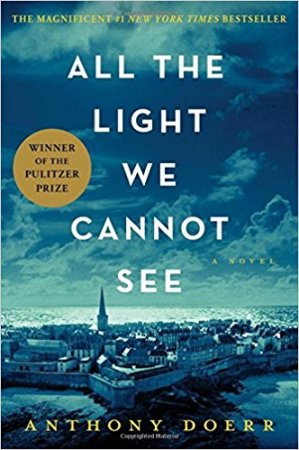 All the Light We Cannot See
All the Light We Cannot See About Grace
About Grace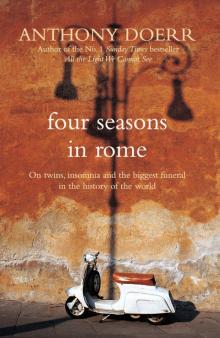 Four Seasons in Rome: On Twins, Insomnia, and the Biggest Funeral in the History of the World
Four Seasons in Rome: On Twins, Insomnia, and the Biggest Funeral in the History of the World Memory Wall
Memory Wall The Best American Short Stories 2019
The Best American Short Stories 2019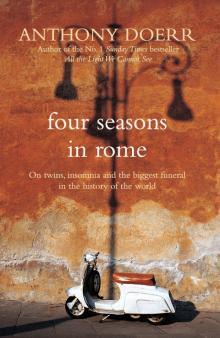 Four Seasons in Rome
Four Seasons in Rome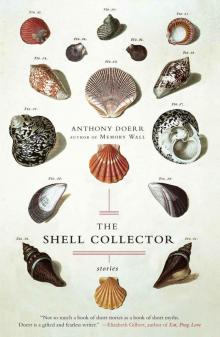 The Shell Collector
The Shell Collector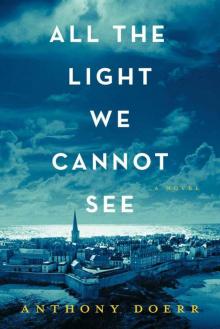 All the Light We Cannot See: A Novel
All the Light We Cannot See: A Novel Memory Wall: Stories
Memory Wall: Stories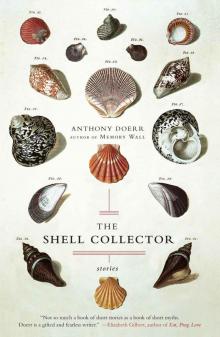 Shell Collector
Shell Collector